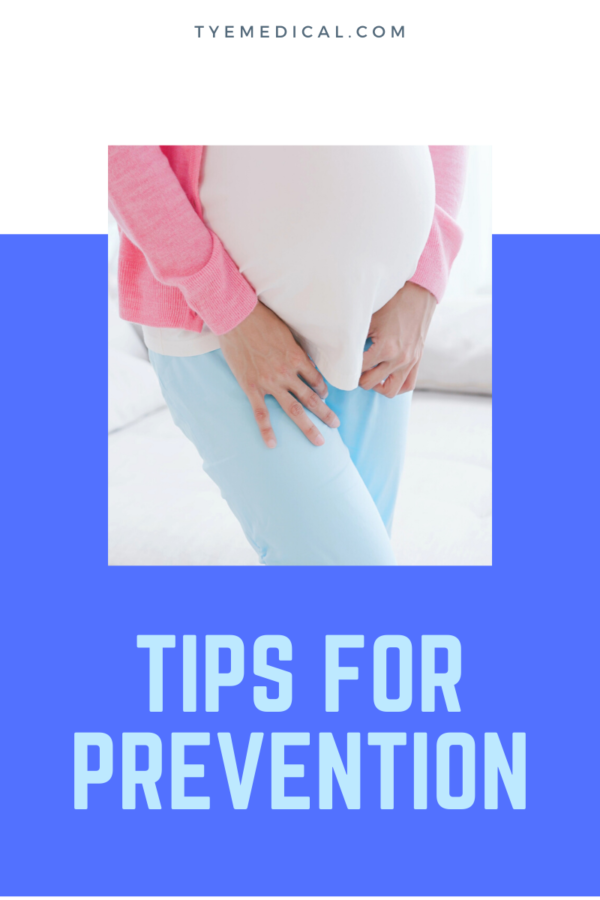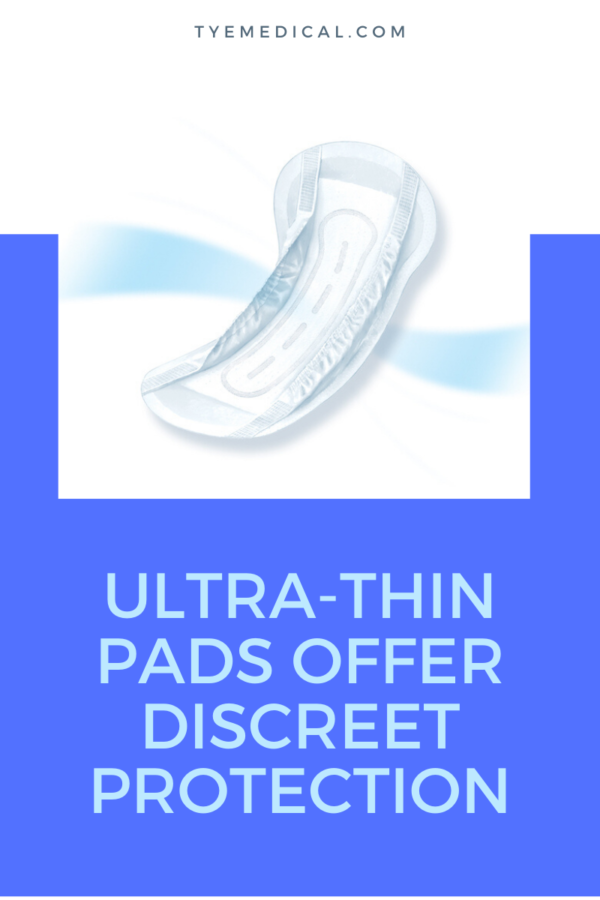Incontinence During Pregnancy: What to Do When You’re Leaking Urine
Written by TYE Medical on Jul 23rd 2020
You probably never thought you’d be searching the internet about incontinence at this age. But here you are asking the all-knowing web what to do about incontinence during pregnancy. While it’s true that you need to address the issue – you can relax! It’s common to experience urgency and some bladder leakage while pregnant and even after delivery. However, that doesn’t mean you should ignore it. It’s important to pay attention. In most cases, you can take some proactive steps to prevent or relieve symptoms, but sometimes postpartum incontinence requires medical attention.
So here’s what you need to know about incontinence and pregnancy.
Why Am I Leaking Urine During Pregnancy?
When you’re pregnant, your typically resilient pelvic floor muscles must support additional abdominal weight. If you already read our article, The Mysterious Pelvic Floor: Why Both Sexes Should Pay Attention, then you know the pelvic floor is largely responsible for keeping your bladder and other pelvic organs in place. When these already stretched muscles are weakened due to the weight of the little miracle you’re carrying around, other organs might press on the bladder or keep you from adequately closing the urethral sphincter. (The pelvic floor also controls your sphincter muscles.) All this leads to potential bladder leaks, especially when you sneeze, cough, or laugh. This type of incontinence is often referred to as stress incontinence and is a common type of incontinence during pregnancy.
Even if you’re not leaking urine, you might notice increased urgency while pregnant. It’s called overactive bladder (OAB) or urge incontinence. You typically need to go often – and now! No need to worry about this either since the condition is usually temporary. Symptoms occur when your enlarged uterus presses on bladder nerves, signaling a sudden and intense need to find the bathroom regardless of how full or empty your bladder is. Sometimes urine leaks accompany OAB and sometimes they don’t.
Help! What If I’m Still Leaking After Delivery?
No need to panic. Women might leak urine for up to three months after delivery, a condition called postpartum incontinence. Just like during pregnancy, it’s typically stress incontinence that produces leaks when you laugh, sneeze, or cough. Even though you’re not carrying as much additional weight after delivery, those pelvic floor muscles need time to strengthen and become resilient again. Pregnancy hormones have allowed these muscles to stretch more than normal to make room for the baby. And as we mentioned above, they can be further weakened by pregnancy weight. So, even when your abdomen is much lighter, your hormones and the pelvic floor need some time to return to normal. In the meantime, you might experience leaks.
Risk Factors for Postpartum Incontinence
Not everyone experiences incontinence during pregnancy or even after delivery. However, some women are more prone to postpartum incontinence than others. Some of these risk factors include:
- Previous pregnancy and delivery
- Previously experienced incontinence during pregnancy
- Had a vaginal delivery
- Had a forceps delivery
- Had a vacuum delivery
- Had a multiples pregnancy (twins, triplets, etc.)
- Being overweight
 Can You Prevent Pregnancy and Postpartum Incontinence?
Can You Prevent Pregnancy and Postpartum Incontinence?
Of course, there are no guarantees, but you have a good shot at preventing incontinence during pregnancy (and after) if you follow these tips:
- Avoid high-impact exercises that jar your body and your pelvic floor. High impact exercises include running, jogging, step aerobics, or anything where both your feet leave the ground at the same time.
- Practice prenatal yoga or other core-strengthening programs that strengthen the pelvic floor. These types of exercises will help your pelvic floor muscles regain resiliency more quickly, providing the necessary support for your bladder and other organs.
- Monitor weight gain to minimize additional pressure on the pelvic floor. Try to maintain a healthy pregnancy weight to prevent further weakening of the pelvic floor muscles.
- See a physical therapist for targeted pelvic floor exercises if you have risk factors and are concerned about developing long-term incontinence. They can develop a personalized plan for you.
Managing Urine Leaks During and After Pregnancy
Sometimes, even if you’re doing your best to prevent incontinence during pregnancy, it just happens. But there are some things you can do while you wait for this embarrassing pregnancy pitfall to end.
Practice Kegels – A lot!
Yes, we’ve already mentioned pelvic floor exercises and yoga for preventing pregnancy and postpartum incontinence. But if you’re experiencing leaks, it’s time to step up the Kegel exercises. Kegels specifically target your pelvic floor muscles and can be done discreetly almost anywhere. It involves squeezing the muscles that stop urine flow, holding, and then releasing them. It’s like lifting weights for your pelvic floor! Aim for ten repetitions at least three time a day. This can give you more bladder control.
Schedule Potty Time
The best way to avoid embarrassing leaks is to head them off. If you’re running to the bathroom every 45 minutes, try urinating every 30 minutes to avoid mishaps. For postpartum incontinence, you can begin training your bladder by extending the time between bathroom trips until you reach your maximum. It’s a way of gradually training your bladder while also avoiding leaks.
Don’t Rush It
Remember that your bladder is a muscle. It does its best work when relaxed. So if you want to reduce urgency and frequency, take your time when you go. This will ensure you’re emptying your bladder completely. When it remains partially full, it doesn’t take much to trigger the need to urinate again.
Be Prepared for Leaks
Whether you’re experiencing incontinence during pregnancy or after, it might be time to buy some light incontinence products like pads. Even minor dribbles can be uncomfortable and generate odors. These are best handled with products that are designed to absorb and conceal urine. Look for pads that are “ultra-thin” and discreet. You’ll also want an incontinence pad that provides a light leakage barrier on the sides and promises odor control.
Sometimes women try to use menstrual pads for urine leaks. That’s something you don’t want to do! All those great features we just mentioned – like odor control, absorbency, and leak barriers – you don’t get those with a menstrual pad (or not to the degree you need). Urine requires a whole other level of protection on every front. (Think about it.) Urine is much less viscous (runnier), requires a greater degree of absorbency, and demands some serious odor control. It doesn’t take long for a little dribble to soak through (or leak through) a menstrual pad and begin emitting a strong smell.
Choose a quality incontinence pad rather than reaching for a poor substitute. You’ll be glad you did!
 Can I Do Other Types of Exercises During Pregnancy?
Can I Do Other Types of Exercises During Pregnancy?
You don’t have to let incontinence during pregnancy stop you from reaping the benefits of prenatal exercise. Not only does it help you keep those excess pounds at bay (craving ice cream, anyone?), it also keeps your body in shape for delivery. Birthing that little angel is extremely hard work! Think of exercise during pregnancy as training for a mini marathon. It might be challenging at times, but you’ll thank yourself later.
First, check with your OBGYN before starting a prenatal exercise routine. You’ll want to be sure you and the baby are healthy enough for additional physical activity.
Movements to Avoid During Pregnancy
It’s easier to injure your pelvic floor while pregnant due to the way your abdominal muscles split to accommodate your growing abdomen. Certain exercises can strain these muscles and lead to pelvic floor damage. Pelvic floor damage during pregnancy is a known cause of prenatal incontinence and incontinence after delivery.
Here are movements that involve the transverse abdominals and should be avoided:
- Planks
- Sit-ups
- Straight leg raises
- Twisting crunches
If you’re uncertain about a specific ab exercise, refer to this guide for information on safe ab workouts.
Low-Impact Exercises for Pregnancy and Bladder Leaks
Let’s talk about what you can do. These types of workouts won’t jar your body and are generally considered safe for moms-to-be even into the third trimester. Fortunately, they’re also best if you have symptoms of incontinence during pregnancy.
- Swimming
- Walking
- Elliptical workouts
- Indoor cycling
- Zumba
- Bodyweight workouts
- Prenatal Pilates (in-person or videos)
- Prenatal yoga (in-person classes or videos)
 Get Discreet and Comfortable Protection Against Light Bladder Leaks
Get Discreet and Comfortable Protection Against Light Bladder Leaks
Most women don’t leak excessive amounts of urine during or after pregnancy, which means you probably don’t need our high-absorbency products. However, what might appeal to you during these months are light incontinence pads or underwear that are:
- Ultra-thin
- Unnoticeable
- Comfortable
- Odor controlling
- Made with leak barriers
- High quality
- Shipped discreetly
If that sounds like something you need, we have a great option:
- Ultra-Thin Pads (various absorbency levels)
If you need some help deciding on the best product for your needs, our friendly staff is standing by to chat with you online.

